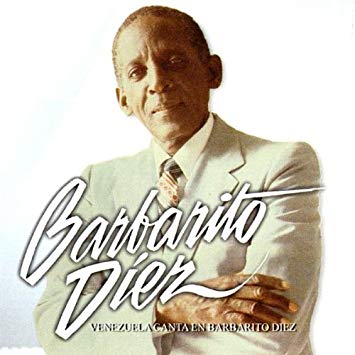BARBARITO DIEZ “REY DEL DANZÓN CUBANO” EN EL ANIVERSARIO DE SU FALLECIMIENTO. PHOTOS/VIDEOS.
Una leyenda de la música cubana, Bárbaro Diez Junco representa al mejor vocalista romántico masculino en la historia del danzón. Como estilista relajado pero romántico, tenía una voz tenor amigable con una dicción correcta y un sentido fácil de sentir, lo que evitó que la música tradicional cubana fuera invadida por pálidas imitaciones de cantantes de ópera masculinos a principios del siglo XX.
Conocido tambien ‘La Voz del Danzón’ continúa Barbarito Diez despertando la curiosidad de investigadores, pasiones de los oyentes y recuerdos en quienes acompañaron su vida.
Con una voz capaz de poner los pelos de punta, una cubanía inconfundible y un ritmo envuelto en sensualidad, Barbarito Diez destaca hoy en las páginas de la historia de la música en la isla por su virtuosismo y maestría, a un cuarto de siglo de su muerte el 6 de mayo de 1995.
VIDEO- Barbarito en “Lagrimas Negras”..
La década del 30 del siglo pasado acunó el nacimiento de Diez como músico, quien sin formación académica legó interpretaciones que lo.posicionaron en la cima del gusto popular e inmortalizó temas clásicos del pentagrama internacional como Lágrimas negras, Olvido, Juramento, El que siembra su maíz, entre otras.
Cantante de amplias facultades vocales, deleitó por 58 años a varias generaciones con piezas de Ernesto Lecuona, Moisés Simons, Eliseo Grenet, Pedro Flores, Rafael Hernández, Miguel Matamoros, entre varios destacados compositores de la nación caribeña.
Guitarras, pianos y tambores, acompañaron la voz inconfundible de Barbarito quien grabó gran número de discos de larga duración, ofreció su talento en diversos países y amenizó programas artísticos en cabarets, teatros, radio y televisión.
Diversas distinciones dan cuenta de su fecunda labor en aras del enriquecimiento cultural de nuestro pueblo, como el reconocimiento por la Cultura Nacional, las medallas Raúl Gómez García y Alejo Carpentier, la Orden Félix Varela de Primer Grado, así como otros galardones y trofeos, destaca Prensa Latina.
Diez aportó originalidad y vigor al danzón, reconocido como Baile Nacional de Cuba y creado por Miguel Faílde en el siglo XIX, con una base instrumental de piano, trompeta, clarinete, flauta, timbales, güiro y claves.
VIDEO- Barbarito en Seleccion Musical…
Toda una vida por su firme calidad entroncó con lo mejor de nuestra tradición musical. Barbarito Diez Junco siempre estará entre nosotros, como un gigante del pentagrama de su majestuosa figura, que cual Palma Real se yergue en el Centro de la Cultura Nacional y en el corazón de nuestro pueblo que permanentemente le rinde Homenaje.
En honor a la memoria de Barbarito Diez, el municipio de Manatí construyó un monumento el cual esta situado en el parque José Martí Pérez de dicho territorio, además de una casa para su descanso que actualmente es la Casa de la Música “Barbarito Diez”.
BARBARITO DIEZ, “KING OF THE CUBAN DANZON” ON THE ANNIVERSARY OF HIS DEATH. PHOTOS/VIDEOS
A legend of Cuban music, Bárbaro Diez Junco represents the best romantic male vocalist in the history of danzón. As a laid-back but romantic stylist, he had a friendly tenor voice with correct diction and an easy-to-feel sense, which saved traditional Cuban music from being overrun by pale imitations of male opera singers in the early 20th century.
Also known as “La Voz de Cuba” and ‘La Voz del Danzón’, Barbarito Diez continues to arouse the curiosity of researchers, the passions of listeners, and the memories of those who accompanied his life.
With a voice capable of making your hair stand on end, an unmistakable Cubanness, and a rhythm wrapped in sensuality, Barbarito Diez stands out today in the pages of the history of music on the island for his virtuosity and mastery, a quarter of a century after his death on May 6, 1995.
The 30s of the last century saw the birth of Diez as a musician, who, without academic training, bequeathed performances that positioned him at the top of popular taste and immortalized classic songs of the international pentagram such as Lágrimas Negra, Olvido, Juramento, El Que sowing his corn, among others.
VIDEO- Barbarito Diez Sings “FRENESI”..
Singer with extensive vocal faculties, he delighted several generations for 58 years with pieces by Ernesto Lecuona, Moisés Simons, Eliseo Grenet, Pedro Flores, Rafael Hernández, and Miguel Matamoros, among several outstanding composers of the Caribbean nation.
Guitars, pianos, and drums accompanied the unmistakable voice of Barbarito who recorded a large number of long-playing records, offered his talent in various countries, and entertained artistic programs in cabarets, theaters, and radio and television.
Various distinctions give an account of his fruitful work for the cultural enrichment of our people, such as recognition by the National Culture, the Raúl Gómez García and Alejo Carpentier medals, the Félix Varela Order of First Degree, as well as other awards and trophies, highlights Latin Press.
Diez brought originality and vigor to the danzón, recognized as the National Dance of Cuba and created by Miguel Faílde in the 19th century, with an instrumental base of piano, trumpet, clarinet, flute, kettledrums, guiro, and keys.
A lifetime for his firm quality connected with the best of our musical tradition. Barbarito Diez Junco will always be among us, as a giant of the pentagram of his majestic figure, which, like a Royal Palm, stands in the Center of National Culture and in the heart of our people that permanently pay homage to him.
In honor of the memory of Barbarito Diez, the municipality of Manatí built a monument which is located in the José Martí Pérez park of said territory, as well as a house for his rest that is currently the House of Music “Barbarito Diez”.
Agencies. Wiki. RHC Julio Perez. BarbaritoDiezBio. Internet Photos. YouTube. Arnoldo Varona. www.TheCubanHistory.com
THE CUBAN HISTORY, HOLLYWOOD.







